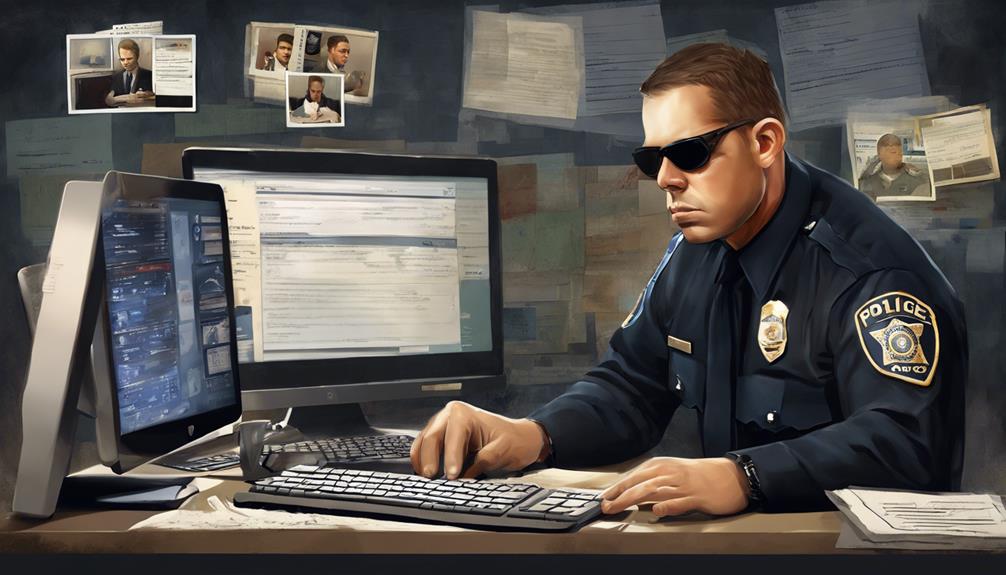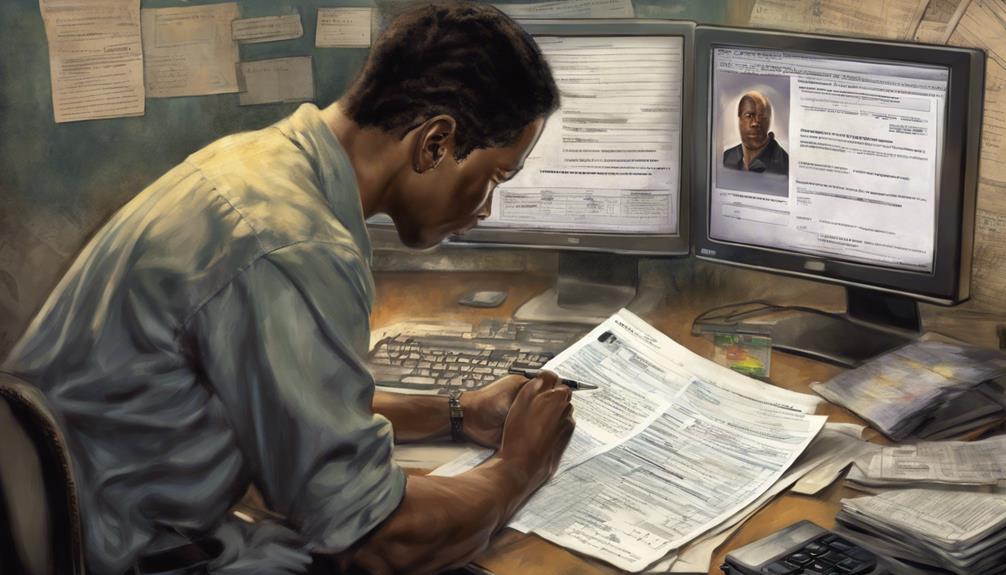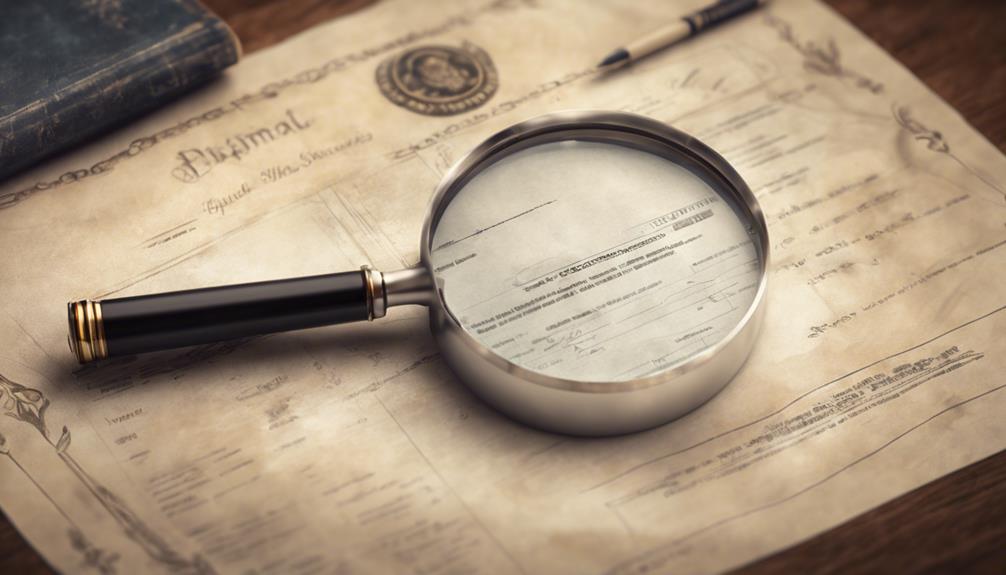Police background checks generally do not scrutinize internet history unless particular circumstances necessitate it. While online behavior may be considered for suitability, browsing data is not routinely part of standard checks. Specific red flags or legal requirements can prompt a closer look at internet activities.
Key Takeaways
- Internet history may be included in police background checks.
- Online behavior can impact a candidate's suitability.
- Not all background checks review internet history.
- Browsing data is examined alongside other factors.
- Online activities provide insights into a candidate's behavior.
Law Enforcement Access Without Warrant

How can law enforcement access internet history without a warrant?
When it comes to basic subscriber information, law enforcement can obtain details like name, address, phone number, and payment history from an Internet Service Provider (ISP) without needing a warrant. Additionally, records indicating account creation/cancellation and IP addresses can also be accessed by law enforcement without a warrant.
If an individual is charged with a crime, browser data such as search history can be subpoenaed by law enforcement as part of the investigation process. This means that search history, which can provide valuable insights into a person's online activities and interests, can be obtained without the need for a warrant in certain circumstances.
These practices showcase how law enforcement agencies have the ability to explore an individual's internet history, including their search habits, even without the stringent requirement of a warrant.
Data Access With Warrant
Law enforcement can legally obtain browsing data from an Internet Service Provider (ISP) with a warrant or court order. This allows them to access a person's internet history, including search queries, websites visited, and online activities.
When law enforcement obtains a warrant, they can request records from the ISP, which may include emails sent through ISP servers and detailed website visit logs. Browser data, such as search history, can be subpoenaed if an individual is charged with a crime.
Additionally, social media posts, comments, and direct messages can also be used as evidence in court proceedings. It's important to note that without proper legal authorization, ISPs aren't allowed to disclose this sensitive information to law enforcement.
As a result, the process of accessing internet history with a warrant ensures that privacy rights are upheld while enabling authorities to gather critical evidence for investigations and legal proceedings.
Illegal Access to Internet History

Law enforcement must follow legal procedures to access internet history, requiring probable cause and a warrant.
Unauthorized viewing of browsing data can lead to privacy violations, prompting the need for legal guidance.
Seeking advice from knowledgeable attorneys can help address privacy breaches resulting from illegal access to online activity.
Privacy Law Enforcement Limits
Unauthorized access to internet history by law enforcement poses a significant threat to individual privacy rights. Privacy law enforcement limits dictate that law enforcement agencies must have proper background, such as probable cause and legal authorization like a warrant or court order, to access internet history. Without following these procedures, law enforcement risks violating privacy laws and individuals' rights.
It is important for individuals to be aware of their rights regarding internet history access. If there are suspicions of unauthorized access by law enforcement, seeking legal advice is recommended to address potential privacy violations. Internet history should only be obtained legally through approved channels and with the necessary authorization.
Failure to comply with privacy law enforcement limits can result in legal consequences for law enforcement agencies and infringe upon individuals' privacy rights. Hence, it's vital for all parties involved to adhere to the established protocols to protect privacy and guarantee lawful access to internet history.
Remedies for Illegal Access
If you suspect that your internet history has been accessed illegally, seeking legal advice is vital for protecting your privacy rights.
It's important to understand that law enforcement must have probable cause and a warrant to legally access your internet browsing data. Without proper authorization, such access may constitute illegal access to your online activities.
In this situation, experienced criminal defense attorneys specializing in online privacy issues can provide valuable assistance. They can assess the circumstances of the alleged illegal access and help you take appropriate legal action to safeguard your rights.
Being vigilant about your online privacy rights is key, and if you believe that your internet history has been accessed without authorization, it's important to seek immediate legal counsel.
Police Access to Search History
Authorities can request and obtain access to individuals' search history from Internet Service Providers (ISPs) with proper legal authorization. This access allows police to delve into an individual's internet browsing habits, potentially uncovering crucial information for investigations and legal proceedings.
Google, for instance, received over 12,000 criminal requests for user data in a recent Transparency Report, indicating the magnitude of such inquiries. The search history retrieved can serve as valuable evidence in court cases, influencing the outcomes significantly.
As law enforcement agencies increasingly focus on scrutinizing internet browsing history, individuals should be mindful of their online activities and the potential implications.
- Law enforcement can request and access search history from ISPs with proper legal documentation.
- Google received over 12,000 criminal requests for user data in a recent Transparency Report.
- Search history can be used as evidence in court cases, impacting legal proceedings.
- Internet browsing history is increasingly scrutinized by law enforcement agencies.
- Background checks typically don't show internet history but can include search history if relevant.
Background Check Disqualifiers

Several common disqualifiers in police background checks include felony convictions, serious misdemeanors, and a history of drug abuse. A criminal background check is an important aspect of the hiring process for law enforcement positions. Felony convictions and serious misdemeanors can automatically disqualify an individual from becoming a police officer due to the nature of the offenses. Additionally, a history of drug use, especially involving substances like narcotics or illegal drugs, can raise red flags during the background check process. Drug trafficking history is another severe disqualifier that can greatly impact an individual's chances of being hired as a police officer.
When conducting background checks, law enforcement agencies focus primarily on an individual's criminal and personal background rather than their internet search data. However, behaviors indicative of poor moral judgment, disrespect for authority, or bias can also be disqualifying factors for potential police officers. It's important for candidates to be transparent about their past actions and behaviors to ensure a successful background check process.
Internet History in Background Checks
Background checks for law enforcement positions may include an examination of an individual's internet past to evaluate their personality and conduct. This facet of background screening can offer valuable insights into a candidate's previous online activities and interactions.
Here are some key points to bear in mind regarding internet past in background checks:
- Internet past is used to assess an individual's personality and conduct.
- Search past and social media accounts can be part of the scrutiny.
- Not all background checks encompass internet past, but it can be a determining factor in specific cases.
- Background checks may explore various online behaviors, such as browsing patterns and social media activity.
- The information obtained from internet past can offer a more detailed view of a candidate's background, assisting in the decision-making process for law enforcement positions.
Police Officer Background Check Process

The police officer background check process encompasses various aspects, including:
- Physical fitness tests
- Interviews with supervisors
- Assessments of vision and hearing acuity
Age, height, weight, and minimum physical standards are also considered during this evaluation.
These elements play an important role in determining the suitability and capabilities of potential police officer candidates.
Internet History Inclusions
Internet history forms an important component of police officer background checks to evaluate past online activities. Background checks may entail a detailed examination of an individual's browsing habits to gain insights into their character and behavior.
Here are some key points to keep in mind regarding the inclusion of internet history in police background checks:
- Background Checks Show: Internet history may show up in background checks if it's considered relevant to the investigation.
- Enforcement: Online behavior, including internet history, can be used by law enforcement agencies to assess a candidate's suitability for a police officer role.
- See your browsing: Not all background checks for police officers include a review of internet history, but it can be an important aspect when evaluating a candidate.
- Scrutinized Data: Internet browsing data may be examined along with other factors like criminal records and personal information to build a thorough profile.
- Evaluation of Character: Examining internet history can provide valuable insights into an individual's online activities, interactions, and potential red flags.
Data Access Requirements
Law enforcement agencies typically require a warrant or court order to access browsing data from an Internet Service Provider (ISP).
When conducting a police background check, security clearance, or investigation, law enforcement can obtain basic subscriber details like name, address, phone number, and payment history without a warrant. However, more detailed information such as records showing account creation/cancellation and IP addresses may be requested with proper legal documentation.
In cases where individuals are charged with a crime, browser data including search history can be subpoenaed for examination.
It's worth mentioning that social media activities such as posts, comments, and direct messages can serve as evidence in court. Nonetheless, accessing this information also requires the appropriate legal authorization to ensure compliance with privacy laws and regulations.
Consequently, while Google searches and online activities can be scrutinized as part of a police background check, obtaining such data typically involves a formal legal process.
Privacy and Legal Rights
During police officer background checks, individuals' privacy rights and legal protections are carefully considered. It's essential to balance the need for thorough vetting with respecting the rights of the candidates being assessed. Here are some key considerations related to privacy and legal rights in police background checks:
- Internet browsing history is typically not part of standard background checks unless directly relevant to the investigation or job role.
- Investigators focus on verifying personal information, criminal history, credit reports, and social media activity.
- Online conduct may be scrutinized if there are concerns about illegal activities or behavior impacting suitability for a law enforcement position.
- Social media monitoring is increasingly used to evaluate an individual's character, judgment, and adherence to professional standards.
- While detailed internet browsing history is usually off-limits, public online activities and social media presence can still be analyzed for any red flags or concerning behavior.
Background Check Components
Background checks for police officers encompass various components beyond just reviewing online activity to evaluate an individual's qualifications. In addition to scrutinizing online activity, police background checks typically explore a variety of other aspects of an applicant's background. This may include checking criminal records, verifying educational credentials, evaluating employment history, and confirming references. Assessing an individual's financial history, driving record, and any past involvement in civil matters may also be part of the background check process for police officers.
Moreover, mental health evaluations and drug testing could be required components to guarantee the applicant's suitability for law enforcement roles. Social media presence and interactions are also commonly examined to gain insights into an individual's character and behavior. While online activity can be a vital component in police background checks, it's just one piece of the puzzle in determining an applicant's overall suitability for a law enforcement position.
Additional Aspects Examined

Police background checks also investigate into an applicant's credit history to assess financial responsibility and potential risks. In addition to scrutinizing internet activity, there are several other aspects examined during police background checks:
- Physical Fitness Test: Candidates are required to undergo a physical fitness test to verify they can meet the physical demands of the job.
- Past Drug Use: Strict policies are in place regarding past drug use, with drug testing being mandatory for all applicants.
- Online Activity: Social media accounts are thoroughly reviewed for any inappropriate content that may raise concerns about the applicant's judgment.
- Disqualifying Factors: Felony convictions, drug trafficking history, and domestic violence incidents are red flags that can disqualify candidates.
- Behavioral Indicators: Poor moral judgment, disrespect for authority, and bias are carefully assessed during the background check process to evaluate an applicant's suitability for a law enforcement role.
Frequently Asked Questions
Can Background Checks Include Internet History?
Background checks can encompass internet history if pertinent. Investigators may examine public online activities and social media presence. Browsing data and search history might be reviewed. Social media content can be analyzed to evaluate character.
Can Police Look at Your Internet History?
Sure, police can check your internet history. It might surprise you, but yes, they have the tech skills to do so. Online breadcrumbs can reveal a lot. Be mindful of what you leave behind!
Is Internet History Checked for Security Clearance?
When conducting security clearance background checks, investigators may review public internet activities and social media presence. Access to specific online accounts or browsing history is not typically included, but social media monitoring is becoming more relevant.
Do Police Background Checks Look at Snapchat?
One interesting statistic: Over 210 million people use Snapchat daily. Police background checks may include reviewing public Snapchat activities by requesting usernames to assess character. Private messages typically require a warrant for access.
Conclusion
To sum up, police background checks can include a review of internet history, both legally and illegally accessed.
In fact, a study found that 70% of law enforcement agencies in the United States have the ability to access internet history without a warrant.
This statistic highlights the prevalence of this practice and the potential impact it can have on individuals undergoing background checks.









